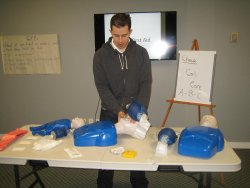Need credentials for CPR training in Honolulu? Don’t worry, Honolulu CPR offers trainees a large selection of Basic Life Support and Advanced Life Support programs for the cheapest rates. Students never complain with the high quality certification training they receive from us – and they keep coming back for re-certification! Other providers will often charge a lot of extra fees for training but not Honolulu CPR. All of our fees are paid upfront before training starts so students don’t have to worry about expenses while they train. If you want to know more details or contact us, visit the Honolulu CPR website to get you started on enrolment.
Certification

Once students pass the post-tests given at the end of each program, we award them certificates for CPR training. These certificates expire after 24 months. Before the expiration date of a credential, they are eligible for renewal for another 24 months if the rescuer signs up for a re-certification program. Re-certification programs are offered through the week as well. In the case that a credential has expired, the trainee has to retake the training program to receive a new certificate.
BLS training
- Basic CPR and AED training – This program is tailored for the public, running for 4 hours over 1 day. It teaches the basics of giving CPR as well as how to use a defibrillator (called an AED) and give basic first aid during a one-person rescue. Basic CPR skills are taught to trainees, primarily how to adequately give chest compressions and rescue breaths. Certification is optional for this program; students are not required to take the skill test at the end of the program to become certified rescuers.
- Basic CPR and AED training for HCPs – Running over 4.5 hours over 1 day, this program teaches the same CPR basis as the first program but tailors the lessons towards people in healthcare, either providers or professionals. Unlike the program for the public, this program requires all trainees to take the certification tests (practical and written) to become certified rescuers.
- Basic Life Support for HCPs – This program runs for the same amount of time as CPR training for HCPs but teaches both one-person and two-person rescue. It also introduces trainees to the BLS guidelins from the American Heart Association, the latest release from 2010.
ALS training
All ALS training programs can only be taken by healthcare professionals (HCPs).
- Advanced Cardiac Life Support (ACLS) – The ACLS program is a 16 hour program that is completed over a course of 2 days. It teaches basic CPR for adult victims, as well as the basics of using a crash cart. Crash carts are typically found in clinical areas like hospitals and diagnostic laboratories. They contain all necessary equipment for dealing with cardiac arrest, equipment like bag valve masks and endotracheal tubes, and medications like epinephrine and intravenous fluids.
- Pediatric Advanced Life Support (PALS ) – This is a program that runs for 14 hours over 2 days. It teaches the basics of CPR provision on children in clinical areas. Introduction to the use of a crash cart is also part of the program, primarily focused on pharmacology for pediatric patients.
